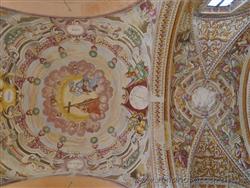|
Benna (Biella)- Church of St. John Evangelist
|
|
|
Show to visit in the Biella area: |
 The church of St. John Evangelist is located in the outskirts of the town, towards Candelo. The church of St. John Evangelist is located in the outskirts of the town, towards Candelo.
The current church was erected at the beginning of the eighteenth century by the inhabitants of the town, probably in place of an older one, as some part of the walls arranged in herringbone style, constructive technique typical of more remote times than the eighteenth century, suggest. In 1832 it was consecrated. The bell tower, leaning against the right arm of the transept, however dates back to 1850. In 1856 the choir loft (Fig. 5) was added, with the pictorial decorations painted two years later by Carlo Artari.
Externally the walls of the Church are largely not plastered and this allows you to appreciate the alternation between parts in bricks and others in river pebbles and square stones. The only entirely plastered part is the sober facade on two orders and vertically devided by pilasters in three sections, the most characterizing element of which is represented by the portico, which occupies the entire width of the facade and anteriorly is occupied almost entirely by a large serliana closed from a metal rash. At the center of the upper order a large mystilinear window of still baroque taste.
The church has a Latin cross plan. The angles to the interior are underlined by composed pilasters with high base and mixed corhizen-ionic capital. The vaults are separated from the walls of multiple frames that run along the entire internal perimeter of the church with the only exclusion of the facade.
A part of the internal walls of the nave was left not plaster to appreciate the wall structure in pebbles arranged in a herringbone style.
The most important artistic element of the church is represented by the pictorial decoration of the crossing and of the presbytery, made in 1714 by Pietro Lace of Andorno and his workshop.
The decoration of the crossing depicts a trompe l'oeil circular balcony the on which rest, at a regular distance, vases with small trees inside.
In correspondence with the vertexes of the four arches, four cartouches are then represented. In three there are the writings "Honor", "Laus", "Et Gloria", while in the fourth was originally present the coat of arms of the country, however covered in the Napoleonic era, in 1898. Behind this empty cartouche a putto supports a cloak, while St. Paul and St. Peter are depicted on the sides.
In the center of the sky in the center of the circular balcony, the Trinity is depicted, surrounded by a crown of clouds populated by cherub heads.
In the plumes, on the other hand, the cardinal virtues temperance, prudence, justice and fortress are allegorically depicted.
On the vault of the presbytery, "stuck" in trompe l'oeil architectural elements enriched with more or less stylized plant-themed decorations, the four evangelists are represented. In the center there is a round that originally contained the coat of arms of the Pianezza family, also canceled in 1898.
The lunette of the back wall of the presbytery is entirely occupied by an Annunciation, with the angel on the left and the Madonna on the right, separated by a fake open trompe l'oeil window (the window is real, but it is walled).
The church is free of artistically significant altars, with the presence of only the higher altar, consisting of a simple stone table.
An altarpiece of the eighteenth century attributed to Carlo Congroosso and depicting the Our Lady Immaculate and Saint John is at the center of the back wall of the presbytery.
The right arm of the transept originally contained an altar dedicated to the Nativity. In it there are today an altarpiece of 1718 depicting the Virgin contemplating the Child and a sixteenth-century statue of a Madonna and Child.
In the left arm of the transept, there are an ancient list of members of the Confraternity of the Holy Trinity of Benna and two sticks bearing at one end an oval frame with depicted within St. John Evangelist.
Categories: Places of historical value of artistic value
Via S. Giovanni, 4, 13871 Benna BI |
Church of St. John Evangelist: Further pictures in the section Photography |